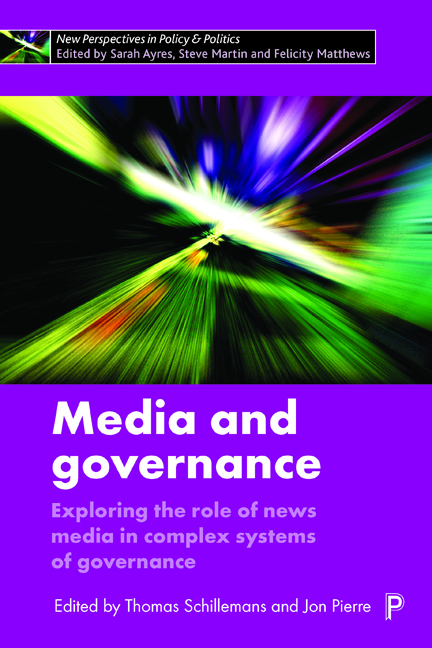Book contents
- Frontmatter
- Contents
- List of figures and tables
- Notes on contributors
- Introduction: Entangling and disentangling governance and the media
- one Governance and the media: exploring the linkages
- two Media and public accountability: typology and research agenda
- three Political control or legitimacy deficit? Bureaucracies’ symbolic responses to bottom-up public pressure
- four Mediatised local government: social media activity and media strategies among local government officials 1989–2010
- five Fighting or fumbling with the beast? The mediatisation of public sector agencies in Australia and the Netherlands
- six The mediatisation of university governance: a theoretical and empirical exploration of some side effects
- seven Managing commercialised media attention in complex governance networks: positive and negative effects on network performance
- eight Over-responsibilised and over-blamed: elected actors in media reporting on network governance. A comparative analysis in eight European metropolitan areas
- Index
two - Media and public accountability: typology and research agenda
Published online by Cambridge University Press: 19 April 2022
- Frontmatter
- Contents
- List of figures and tables
- Notes on contributors
- Introduction: Entangling and disentangling governance and the media
- one Governance and the media: exploring the linkages
- two Media and public accountability: typology and research agenda
- three Political control or legitimacy deficit? Bureaucracies’ symbolic responses to bottom-up public pressure
- four Mediatised local government: social media activity and media strategies among local government officials 1989–2010
- five Fighting or fumbling with the beast? The mediatisation of public sector agencies in Australia and the Netherlands
- six The mediatisation of university governance: a theoretical and empirical exploration of some side effects
- seven Managing commercialised media attention in complex governance networks: positive and negative effects on network performance
- eight Over-responsibilised and over-blamed: elected actors in media reporting on network governance. A comparative analysis in eight European metropolitan areas
- Index
Summary
Introduction
We live in a ‘monitory democracy’ (Keane, 2009). On the one hand, many executive functions have moved away from central governments in what Rhodes (1994) termed the ‘hollowing out of the state’. On the other hand, monitoring functions have partially moved away from parliaments to a host of non-parliamentary institutions, ranging from independent regulators to societal organisations and the news media. The media play a key role in these networks, as they are the prime ‘connecting mechanism’ between the different entities monitoring governments. Critical mass media are increasingly important in the life of public sector organisations in democracies (Fredriksson and Pallas, 2016; Korthagen and Klijn, 2014; and see Chapter One).
Although considerable attention has been paid to the news media as a scrutiniser of governmental organisations (Jacobs and Wonneberger, 2017; Liu et al, 2012), the theoretical connection between news media on the one hand and public accountability on the other has not been investigated systematically. This chapter therefore theorises and explores the roles of media in public accountability (Jacobs, 2014; Maggetti, 2012). The core goal is to develop a theoretical model for understanding the roles of media in public accountability. The key assumption is that the media are an important trigger that ‘activates’ formal accountability institutions, that is, parliaments and regulators, and can also be instruments of accountability.
This chapter has two aims. First of all, the discussion on the role of the media in accountability is currently somewhat opaque. Many public administration scholars (including ourselves) have suggested that the media are highly important for accountability, yet they (and we) have failed to theorise this role in sufficiently clear terms (Flinders, 2012; Maggetti, 2012). In a different outpost of the academic landscape, political communication scholars have also looked at the role of media in accountability. These studies have generated interesting results (Arnold, 2005; Djerf-Pierre et al, 2013; Norris, 2014), yet the relevance of their studies for public accountability in systems of governance is underexplored.
Secondly, discussions on the role of the media in governance often land in the trenches, where some authors come to negative value judgements (Flinders, 2012) while others defend the media (Norris, 2014).
- Type
- Chapter
- Information
- Media and GovernanceExploring the Role of News Media in Complex Systems of Governance, pp. 33 - 52Publisher: Bristol University PressPrint publication year: 2019



